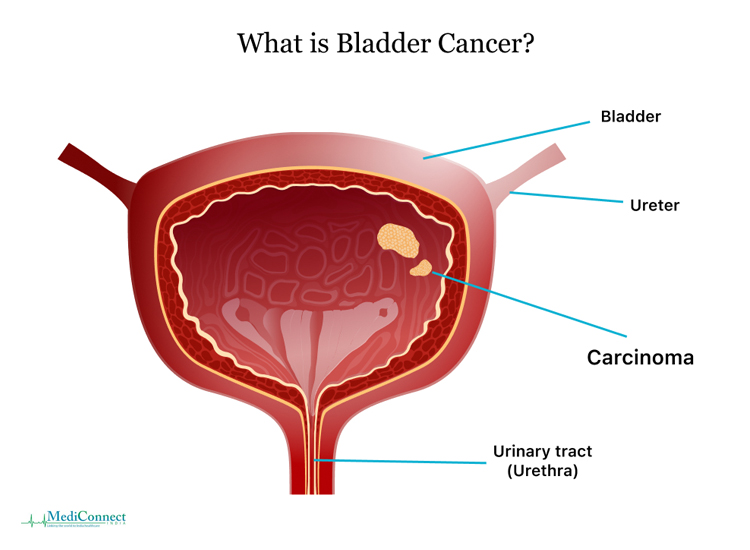Bladder Cancer is one of the common types of cancer. Notably, men are more likely to be diagnosed with this type of cancer than women during their lifetime. It is because of the X chromosomes that are highly expressed in females and associated with the suppression of this tumor. Such kind of cancer begins in the Urothelial Cells that line inside of your bladder.
Most cancers of the bladder are diagnosed at an early stage, and at that time, chances of treatability are higher. However, even early-stage cancers after successful treatment can come back. Consequently, people with bladder cancer must follow up the tests for years after the treatment. In this blog, we will talk about the causes, symptoms, risk factors, and treatment of Bladder Cancer along with useful tips that may help in reducing the risk of cancer.
Bladder Cancer: Know Causes, Symptoms, Types and Treatments
Causes of Bladder Cancer in Men
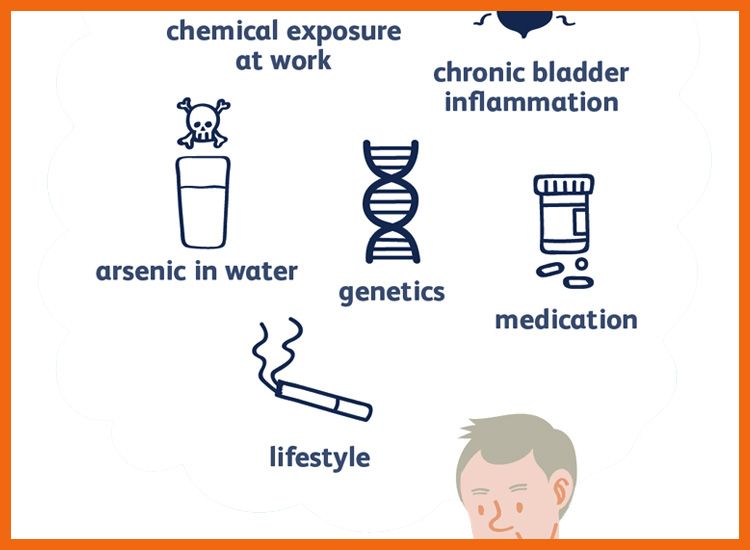
Bladder Cancer takes place when the cells in the bladder start to grow uncontrollably. When the abnormal cells in the bladder cluster, it becomes a tumor and can spread over time. It can start from the surface layer of the bladder to the muscle of the bladder, and then the wall of it. In some cases, it spreads to other parts of the body as well. Carcinogens that are present in tobacco smoke and other industrial chemicals are one of the major known reasons for cancer in men. Hence, the higher rates of smoking and exposure to chemicals increase the chances of bladder cancer in men.
Types of Bladder Cancer in Men
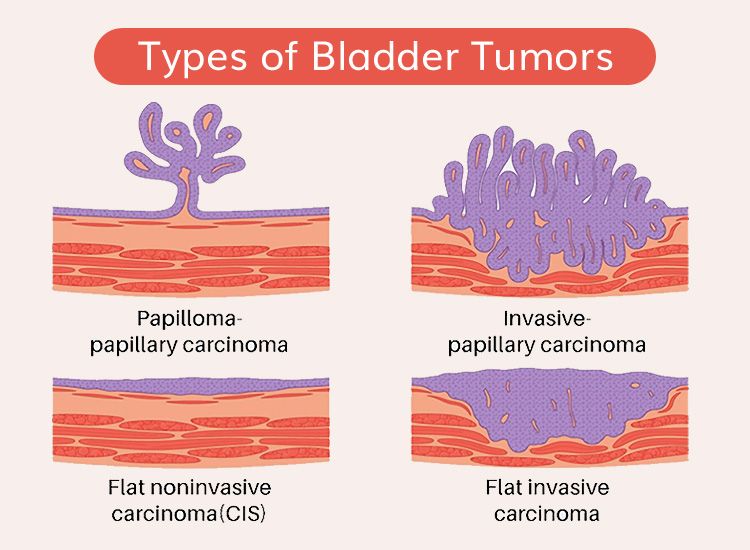
There are different types of cells in the bladder that can convert into cancerous cells. Moreover, the type of cell that becomes cancerous decides the type of Bladder Cancer. After diagnosing cancer through various methods, doctors choose the treatment for cancer treatment in the bladder. There are three main types of bladder cancer –
Urothelial Carcinoma: This type occurs in the cell that lines inside the bladder. Urothelial cells enlarge when your bladder is full and compact when empty. These cells are also found in the urethra therefore cancer can form in such places as well.
Squamous Cell Carcinoma: It is one of the rare types of Bladder Cancer, and it occurs when Squamous Cells develop in the bladder lining. As a result, it creates irritation and inflammation, and over time, these cells convert into cancerous cells.
Adenocarcinoma: This type of bladder cancer develops from the Glandular Cells, and it is only 2% of all bladder cancers.
Also Read: Know the best Health Check-up Packages in India @ lowest cost
Risk Factors of Bladder Cancer in Men
There are several kinds of risk factors that are linked with developing bladder cancer in men. Following are the main factors –
Age: Age is one of the main factors that predominantly affect males who are around 50 to 55 years old.
Smoking: Smoking Tobacco is one of the high-risk factors for bladder cancer. Smokers are more likely to get bladder cancer.
Exposure to Some Harmful Chemicals: Aromatic amines and certain hydrocarbons are some of the prominent risk factors for bladder cancer in men. These kinds of chemicals are mostly used in the production of rubber, petroleum, dyes, paint, metal products.
Radiation Therapy: Men who have received radiation therapy around the pelvic area are more likely to develop bladder cancer.
Previous Bladder Cancer: People who have had bladder cancer are also at high risk that it reoccurs after successful treatment.
Diet: Consumption of processed meats may increase the risk of such cancer in men.
Symptoms of Bladder Cancer in Men
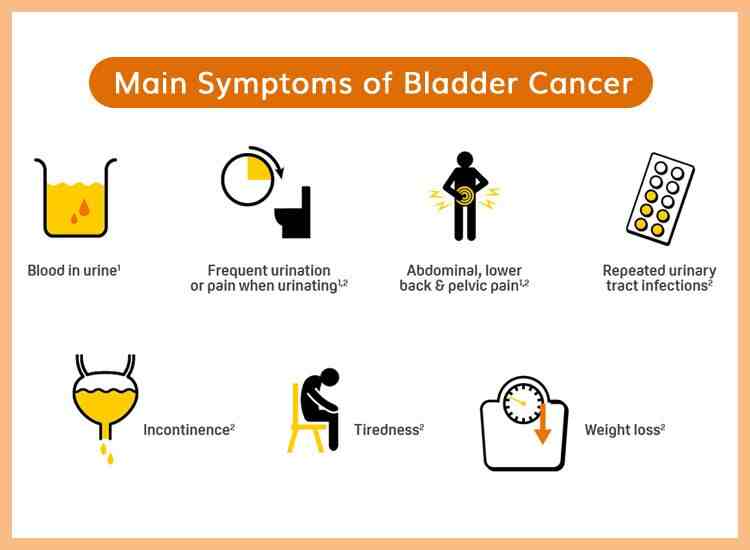
Blood in the urine is often the first sign that you can notice through your naked eyes. Moreover, the quantity of blood decides the color of your urine. The red cells can also be detected through the urine test in the laboratory. In the early stage of cancer, there is usually minimal pain or no pain at all.
Urinary irritation and an increase in the frequency of urination are symptoms of Bladder Cancer. If someone is experiencing the same, it is best to consult your doctor to detect the issue.
If bladder cancer spreads to other areas of the body, symptoms vary. Appetite loss, weight loss, weakness, swollen feet, and muscle pain are some of the common symptoms of advanced bladder cancer in men.
Ways to Diagnose Bladder Cancer in Men
The method to detect bladder cancer depends upon various conditions. Notably, age, symptoms, risk factors, and a history of bladder cancer play a crucial role in choosing a suitable test and procedure. After analyzing your complete condition, the doctor goes with the adequate approach, which may include –
Urine Test: It is a general urine test to detect the presence of blood, cancer cells, bacteria, and other substances such as glucose and protein.
Genomic Urine Test: This is a special kind of urine test that is a diagnosis of superficial bladder cancer at an early stage.
Cystoscopy: In this procedure, a flexible thin tube with a camera inserts into the bladder through the urethra. This method is performed to see and collect the small sample of tissue for lab testing.
Diagnostic Imaging: CT Scan, X-Ray, Ultrasound, are some of the techniques that doctors use to visualize the bladder and nearby areas of the bladder.
[ Find the best Hospitals in India for Medical Tourism ]
Treatments for Bladder Cancer in Men
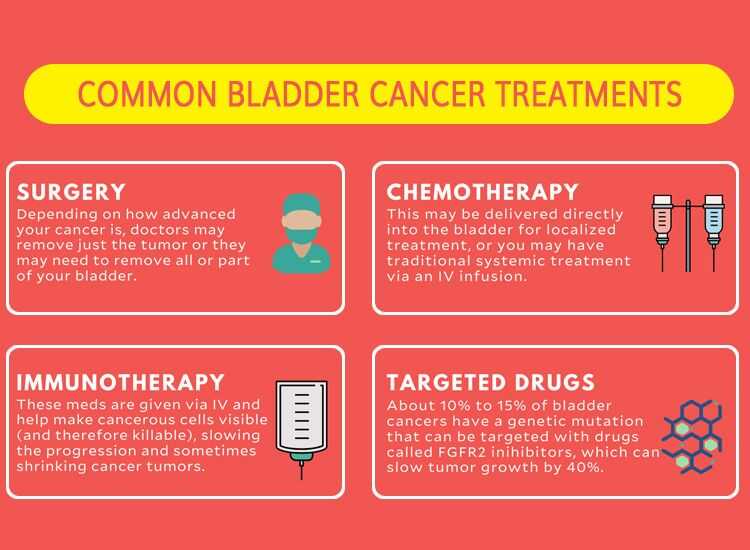
Bladder Cancer can be treated through a single or combination of methods. And choosing the treatment for a patient depends on the type and stage of cancer. Hence, understanding the type and stage of cancer is an integral and first step for treating bladder cancer. Such kinds of cancer can be classified as per the location relative to the bladder. If cancer remains in the superficial layers of the bladder, non-muscle-invasive treatment is suggested. Whereas cancer spreads deeper layers in the bladder, muscle-invasive treatment is recommended for patients. Overall, there are different types of treatment available for bladder cancer in men. Additionally, surgery, chemotherapy, immunotherapy, and radiation therapy are some of the potential treatments for bladder cancer.
Read more: Cancer Treatments in India | Cost | Best Surgeon at top hospitals
Ways to Decrease the Risk of Bladder Cancer
Bladder Cancer cannot be completely prevented but certain things can be done to lower the risk. Smoking is one of the main reasons for Bladder Cancer in men and quitting smoking is the first step that you should take. Another thing is reducing the exposure to chemicals that are associated with cancer of the bladder. Consuming a healthy diet that includes fruits and vegetables and limiting your consumption of processed meats.
Considering all points above, the treatment of Bladder Cancer in Men is widely available in the medical field. The majority of bladder cancers are easily detected through the symptoms. But it is mandatory to consult a doctor for any kind of discomfort in your body and go through a check-up. Keeping all the prevention points in mind can decrease the risk of such cancer. Choose Medical India Tourism to avail the best medical treatment and get a customized approach with utmost care.
Related Post:
Ovarian Cancer Treatment in India
Gallbladder Cancer Treatment in India
Pancreatic Cancer Treatment and Surgery in India
Bone Cancer/ Bone Tumor Treatment in India
Skin Cancer Treatment in India
Blood Cancer Treatment in India
Cervical Cancer Treatment in India
Prostate Biopsy in India
